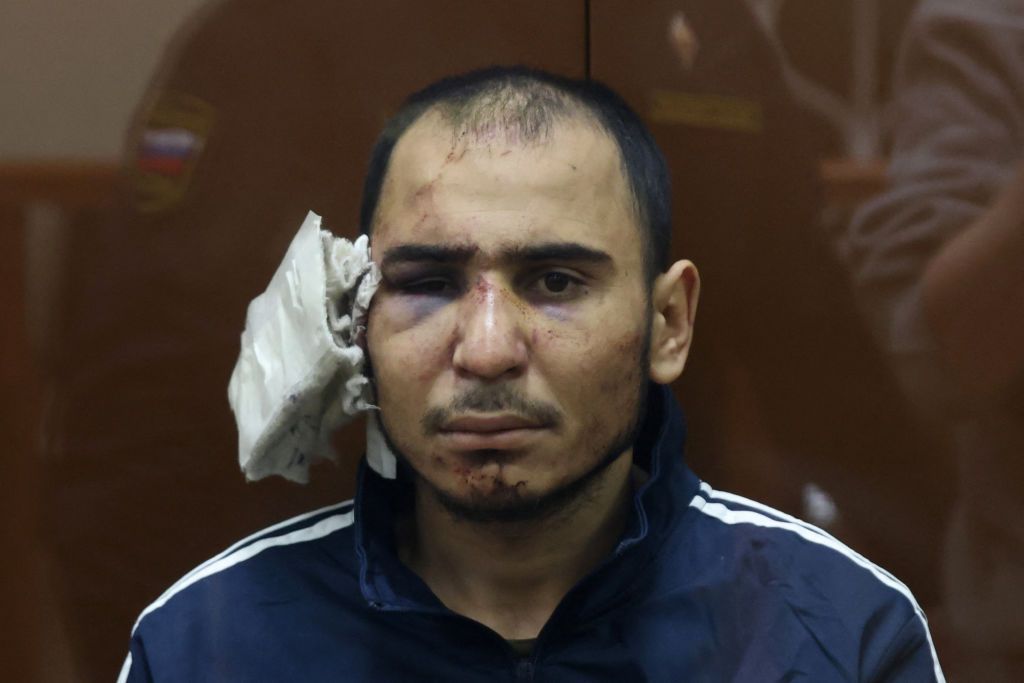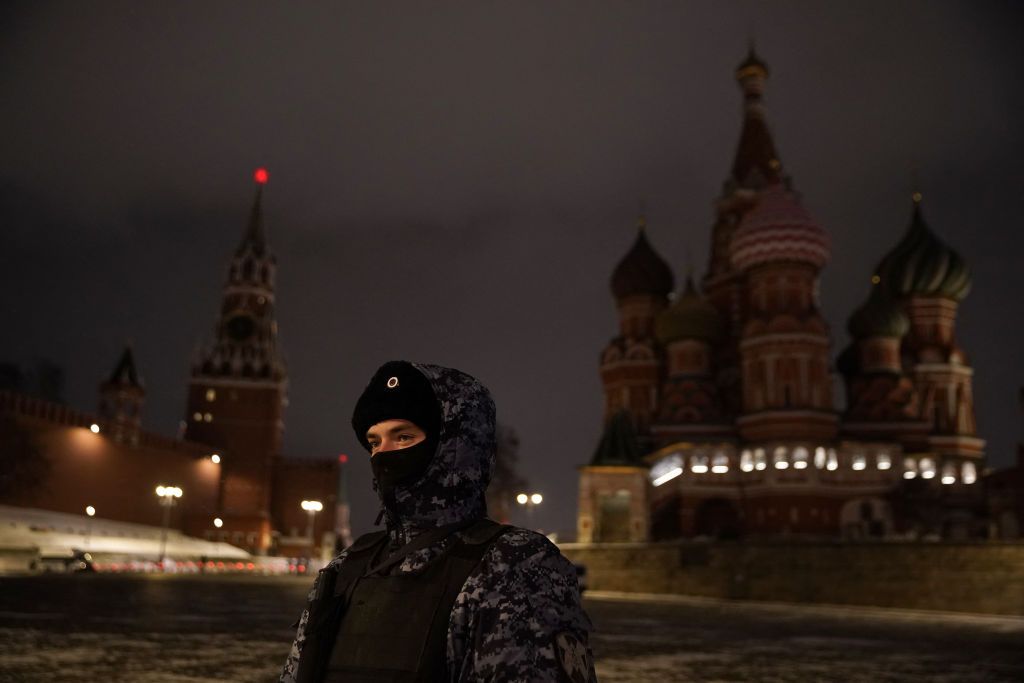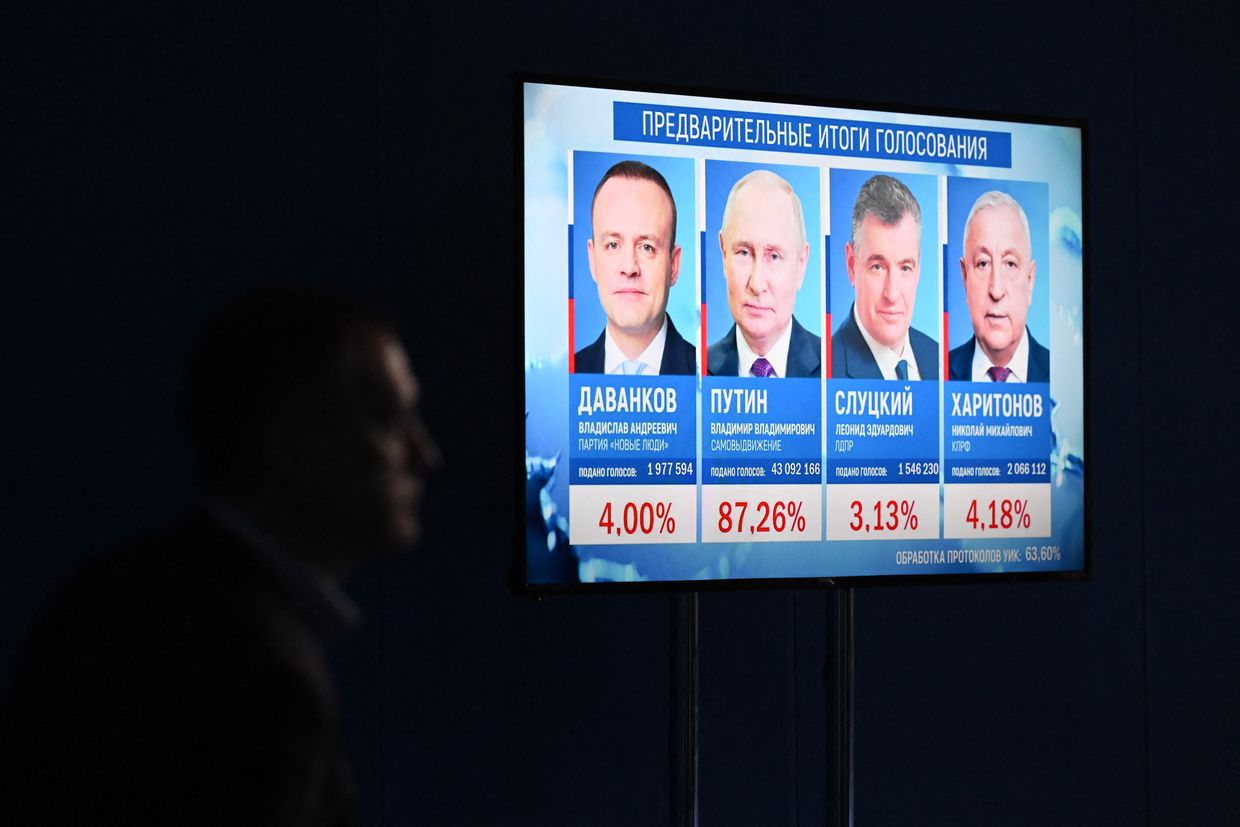In Putin’s Russia, state violence is on full display

A man suspected of taking part in an attack on a concert hall that killed 140 people, the deadliest attack in Europe to have been claimed by the Islamic State jihadist group, is escorted by Russian law enforcement officers prior to his pre-trial detention hearing at the Basmanny District Court in Moscow on March 25, 2024. (Tatyana Makeyva/AFP via Getty Images)
When the men accused of committing last week's terrorist attack in Moscow appeared in front of a Russian court, their battered faces told a story of physical torture.
The four men — who stand accused of opening fire on crowds at Moscow's Crocus City Hall on March 22, killing at least 140 people — all appeared in the dock heavily bruised. One defendant, Muhammadsobir Fayzov, was brought into the courtroom in a wheelchair and appeared barely conscious throughout the proceedings.
He sat in the dock, barefoot and wearing a hospital gown, attended by medics.
Evidence of torture also appeared outside the courtroom.
Between the group's arrest in the early hours of March 23 and their arraignment close to the evening of the following day, several videos were tacitly leaked showing the men's interrogations.
In one video, soldiers appeared to be shown electrocuting a defendant's genitals. In another, officers cut off the ear of a man who appeared to be defendant Saidakrami Rachabalizoda and forced him to eat it.
In court, Rachabalizoda arrived with his head heavily bandaged.
The use of torture by governments is not uncommon, especially in authoritarian states such as Russia.
But to see these acts on display — whether imprinted onto defendants' faces or depicted on film — sets the Crocus City Hall case apart.
It hints at the wider messages that the Russian government hopes to send to both terror groups, the Russian public, and the myth of Putin's strength and control, shattered by the attack.
Government violence and vengeance
Researchers generally give three reasons why state security services use torture.
It can be used to gain intelligence — although research has repeatedly proven that information gained through torture is notoriously unreliable. It can also be used to gain evidence, particularly in countries with weak judicial systems.
Yet while many authoritarian governments will use torture, the majority will actively try to hide its use, says Courtenay Monroe, professor of political science at the University of California, Russia's security services have made no such attempts in the Crocus City Hall case.
"These individuals being brought into court showing the signs of scarring torture is actually quite unique in the modern day," she says.
Part of this is due to the nature of the men's alleged crimes. Video released by the Islamic State — who claimed responsibility for the attack — shows the assailants shooting at the crowd with semi-automatic weapons at point-blank range, attacking victims with knives, and throwing Molotov cocktails.
At least 140 people were murdered, including several children.
In such a horrifying case, showing the torture of the alleged perpetrators is unlikely to provoke outrage in the court of public opinion. In fact, it could stir approval.

"When you ask people if they are pro-torture, people say no," says Monroe. "But when social scientists have done careful experiments to probe public opinions, they have discovered, unfortunately, that the public is more supportive of torture if it involves particular individuals for particular reasons, such as terrorism."
But there are also other motivations.
In showing how detainees have suffered at the hands of its officers, Russia's security services likely hope to emphasize its willingness to engage in violence — a warning to both terror groups and ordinary people.
Besides the four main suspects, Russian courts arrested four more people – a man who allegedly rented an apartment to the perpetrators, and a man who allegedly sold them a car, together with his brother and father.
The latter showed up at the police station voluntarily, he said, when he saw the car he sold appear on national TV.

In a statement released after the detainees' arraignments, Russian activist group Crew Against Torture (formally known as the Committee Against Torture, an NGO that was shut down after being labeled a "foreign agent" by the Russian government) warned that "if a state tolerates torture against terror suspects, it can also carry out unlawful violence against other citizens."
Monroe agrees.
"Oftentimes, governments engage in violence when they are trying to signal to the public or the opposition their willingness and capacity to do these acts," she says. "I think that they're certainly trying to publicize it."
This need to project strength, but also a drive for revenge, is another key reason why states such as Russia use violence, says Dr. Frank Foley, a senior lecturer in International Relations at the Department of War Studies at King's College London.
He describes it as a way to reassert dominance and to fight back against a perceived humiliation.
"The security services were embarrassed by the failings that preceded that attack, so when they came across the individuals who allegedly did it, they exacted revenge," says Dr. Foley. He drew parallels to Guantanamo Bay, where the U.S. government admitted in 2009 it had tortured inmates.
State images of the facility in 2002 showed detainees kneeling, masked, and bound: an image of suppression giving American troops the control they lacked on 9/11.
"It's a very brutal and graphic subjugation of the enemy," Foley says.
Similarly, Russia's security services, instrumental in repressing dissent in President Vladimir Putin's Russia, hope to redeem themselves in the attack's aftermath — telling the world visually that they are still very much in control.
A culture of impunity
The openness with which torture has been conducted in the Crocus City Hall attack ultimately speaks to a culture of impunity throughout Russia itself.
Torture is banned under the Russian constitution. Moscow is also a signatory of the UN Convention Against Torture. Neither of these facts have changed how detainees have been treated, although Russia's commissioner for human rights, Tatyana Moskalkova, called the use of torture "unacceptable" in a recent interview with Russian state news agency TASS.

The Kremlin seemingly expects no repercussions, says Foley — and past experience shows that, at least for now, they are likely to be right.
"Vladimir Putin and the Russian authorities have already been accused of all sorts of war crimes in the context of their invasion of Ukraine," he says.
"They are facing some legal difficulties because of that and some attempts to try to make them accountable, but that doesn't stop them. They obviously feel a sense of impunity: that they can do what they want, and they're not going to face consequences for that," he says.















